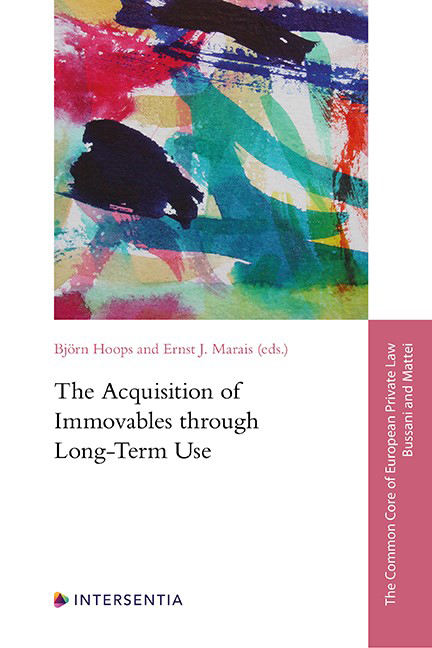Book contents
- Frontmatter
- General Editors’ Preface
- Preface
- Contents
- List of Cases
- Table of Legislation
- List of Abbreviations
- List of Contributors
- Case PART I INTRODUCTORY MATTERS
- PART II CASE STUDIES
- PART III GENERAL CONCLUSIONS
- Appendix I Instructions for the Project on the Acquisition of Immovables through Long-Term Use
- Index
Comparative Analysis – Case 1
Published online by Cambridge University Press: 26 May 2022
- Frontmatter
- General Editors’ Preface
- Preface
- Contents
- List of Cases
- Table of Legislation
- List of Abbreviations
- List of Contributors
- Case PART I INTRODUCTORY MATTERS
- PART II CASE STUDIES
- PART III GENERAL CONCLUSIONS
- Appendix I Instructions for the Project on the Acquisition of Immovables through Long-Term Use
- Index
Summary
GENERAL INTRODUCTORY REMARKS ON CASE 1
Case 1 and its variations touch on several key issues surrounding the acquisition of land through long-term use. These matters pertain to whether countries permit intentional acquisition of land through long-term use and, concomitantly, whether registration plays a role in this context (Variation 1.1.), what, if any, are the constitutional implications of acquisitions of land through long-term use (Variation 1.1.), the potential effect an acquisition might have on a third party purchaser who has no knowledge of the acquisition (Variation 1.2.), the potential impact an acquisition might have on existing security rights over the land (Variation 1.3.), and, finally, the impact of long-term use on rented land (Variation 1.4.). These aspects are discussed under each of the relevant headings below.
COMPARATIVE REMARKS ON VARIATION 1.1.
INTRODUCTION
In Variation 1.1. reporters had to answer whether Jacob and Mpumi may intentionally acquire land belonging to Nelson through long-term use. Should such acquisition be permitted, several related questions arise, namely whether the land should be registered in their names to enjoy protection against Nelson and third parties, whether the acquisition complies with constitutional protection of property, and whether Nelson has a claim for compensation against Jacob and Mpumi, or the state, for the loss of his land. Finally, should Jacob and Mpumi not acquire the land, reporters had to consider whether their long-term use plays a role if Nelson seeks to evict them. The countries ‘answers to these questions, and the implications of these answers, are set out under the headings that follow.
INTENTIONAL ACQUISITION OF LAND THROUGH LONG-TERM USE
The first question to Variation 1.1. concerns whether a person who intentionally occupies the land of another may acquire such land through long-term use. Such occupation involves situations where the land is used with the knowledge that it belongs to another person, which is the case with Jacob and Mpumi using Nelson’s land. This type of use is usually embodied in a notion of ‘bad faith’.
- Type
- Chapter
- Information
- The Acquisition of Immovables through Long-Term Use , pp. 617 - 634Publisher: IntersentiaPrint publication year: 2022



